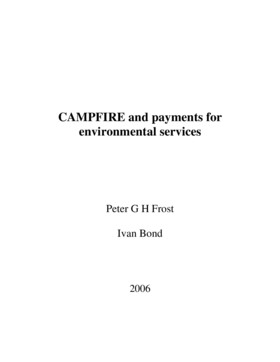CAMPFIRE and payments for environmental services

There has been increasing support in recent years for the use of payments for environmental services (PES) as a means to advance the goals of both poverty reduction and conservation. Payments for Environmental Services are compensation mechanisms that reward people for managing ecosystems and providing environmental services, and are based on the premise that positive incentives can lead to changes in land-use practices. The Communal Areas Management Programme for Indigenous Resources (CAMPFIRE) is a longstanding initiative that shares many of the features of PES. CAMPFIRE began in the late 1980s in Zimbabwe and has been widely emulated in southern and eastern Africa. Under this programme, communities using land under communal tenure have been granted authority to market the wildlife in their area to safari operators. The revenue and other benefits received on behalf of the communities is paid out to them according to an agreed formula. In this paper, we describe the CAMPFIRE programme’s evolution and we explore some of the lessons learned about implementation, performance, outcomes and possible adaptations that may help in the development of PES programmes.
Cite this publication
Available at https://www.iied.org/15503iied